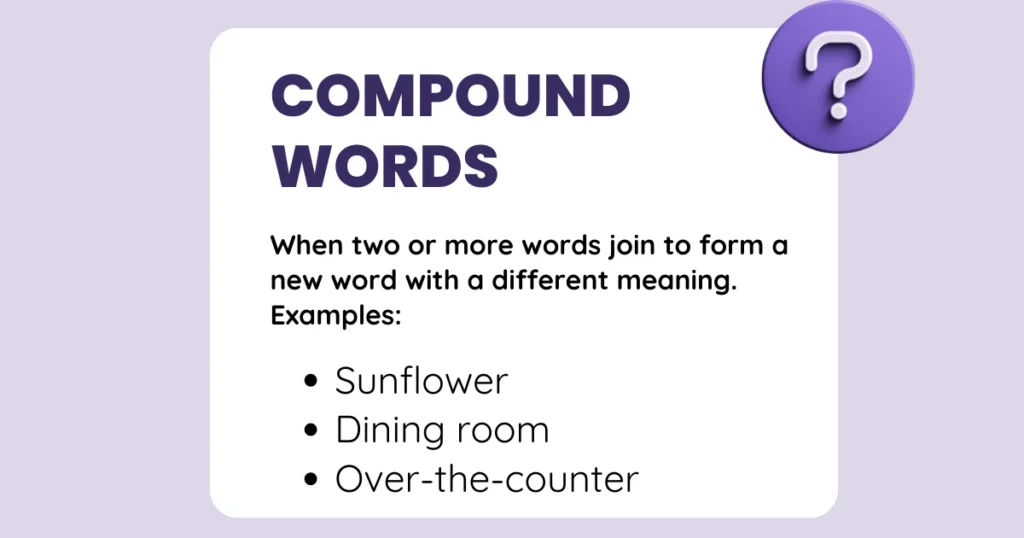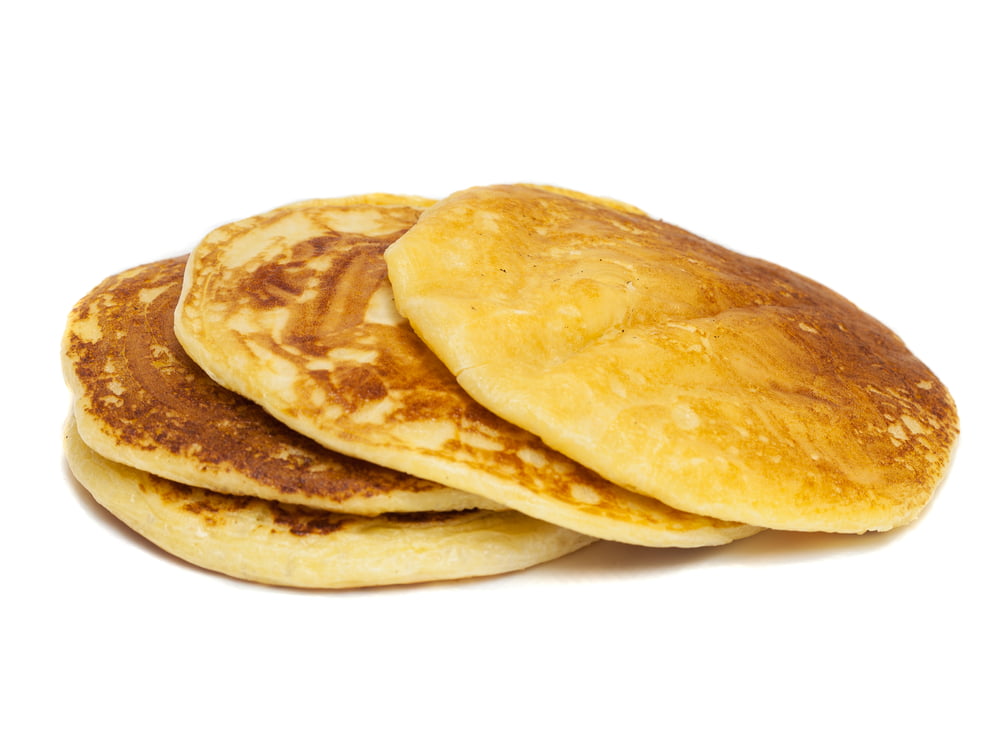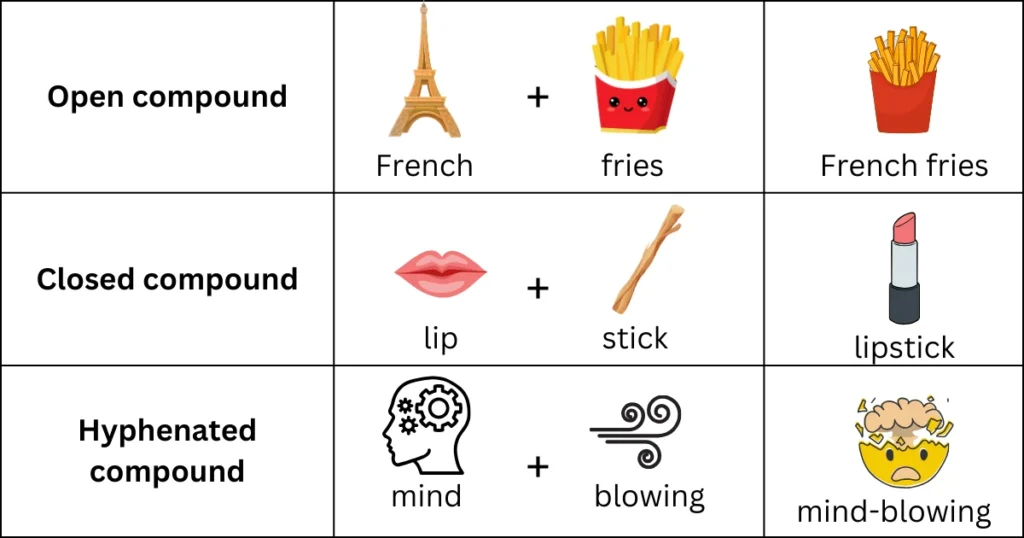What are compound words?
👍🏼Usage Note✓
The children loved playing on the playground.✓
She lives in a beautiful two-story house.✗
We ate lunch in the diningroom.✗
My sister in law will be visiting next month.Playground, dining room, sister-in-law.
What do these words have in common, if anything at all? If you guessed that they’re all compound words, then you are absolutely 100% correct! Compound words are not complicated: they’re just words that have been mashed together to form an entirely new word altogether, with a different meaning than either of the words in isolation.

The word pancake, for example, is a compound word that is made up of the two individual words, pan and cake. We know that the words pan and cake have their own distinct meanings, but when they’re combined, they form a new word with its own distinct meaning (which is a pancake).

The word compound originally comes from the Latin word componere, “to put together”, which is precisely what compound words are. The word compound can also be an adjective to describe something that consists of two or more parts or components.
Types of compound words
Compound words come in three main forms: closed, open, and hyphenated.

Closed compounds
Closed compounds are usually nouns, and do not use a space between both words. Some familiar examples of closed compounds are:
- Chick + pea = chickpea
- Sun + flower = sunflower
- Lip + stick = lipstick
| Part of speech | Closed compounds |
| Noun | backpack, boyfriend, breakfast, bypass, checkout, cheesecake, highway, login, newborn, payout, peanut, smartphone, weekend, wherewithal |
| Pronoun | anyone, everything, nobody, oneself, themselves |
| Verbs | babysit, breakfast, bypass, cannot, snowball |
| Adjective | everyday, heartbreaking, nearby, newborn, shamefaced, spellbinding |
| Adverb | anymore, anyway, awhile, elsewhere, hereby, however, maybe, moreover, nevertheless, nowadays, spellbindingly |
| Preposition | insofar, into, throughout, upon, within |
| Conjunction | whenever, whereas |
Compound words, create a mind map connecting the separate words (e.g., “play” + “ground” = playground). This visual association helps recall correct spelling and meaning.
Open compounds
Open compounds include a space between the pair of words that act as a single “word” or unit; they’re always used together, and in the same order. Many open compounds are nouns, but as you’ll see from the chart below, they can also be verbs, adverbs, pronouns, prepositions, and so on.
When open compound are verbs are made up of verbs, these are called phrasal verbs. Phrasal verbs follow their own rules, but generally speaking, only one of the words in the group is conjugated while the others remain the same.
| Part of speech | Open compounds |
| Noun | artificial intelligence, house party, living room, roller coaster, search engine, test drive, theme park, walking stick attorney general, common sense, French fries, high school |
| Pronoun | each other, no one, one another |
| Verbs | check in, figure out, go ahead, hold off, kick off, log in, pass by, used to |
| Adverb | after all, en route, next to, with feeling |
| Preposition | as far as, close by, such as, next to, with regard to |
| Conjunction | as far as, in that |
Hyphenated compounds
Hyphenated compounds, as you may have guessed, use a hyphen to join the two or more words to create a compound. For the most part, they’re formed from adjectives or adverb-adjective combinations. Some examples of hyphenated compounds are:
- Merry-go-round
- Over-the-counter
- Mother-in-law
| Part of speech | Hyphenated compounds |
| Noun | check-in, go-ahead, kick-off, know-it-all, man-of-war, merry-go-round, run-in, runner-up, sister-in-law, well-being |
| Verbs | strong-arm, test-drive |
| Adjective | empty-handed, full-fledged, lightning-fast, long-term, mind-blowing, off-duty, over-the-counter, roller-coaster, run-of-the-mill, up-to-date, walk-in |
| Adverb | lightning-fast, mind-blowingly, red-handed |
Compounds vs. portmanteaus
A portmanteau (also called a blend) is a word that’s formed by merging two independent words together. An example is the word smog: smog is a blend of two individual words, i.e., smoke + fog.
Portmanteaus are different from closed compounds because at least one of the words that form the portmanteau is not used in its complete form: some letters have been omitted or moved. Compound words, by contrast, use the entire form of the individual words that they’re formed from. Other examples of portmanteaus include:
- Internet (interconnected + network)
- Brunch (breakfast + lunch)
- Hangry (hungry + angry)
List of common compound words (150+)
- After + Noon = Afternoon
- Air + Port = Airport
- Back + Ground = Background
- Base+ Ball = Baseball
- Bed + Room = Bedroom
- Butter+ Fly = Butterfly
- Card + Board = Cardboard
- Class+ Room = Classroom
- Coco + Nut = Coconut
- Cup + Cake = Cupcake
- Day + Light = Daylight
- Dog + House = Doghouse
- Door + Bell = Doorbell
- Ear + Ring = Earring
- Eye + Glasses + Eyeglasses
- Finger + Nail = Fingernail
- Foot + Ball = Football
- Gold + Fish = Goldfish
- Grass + Hopper = Grasshopper
- Hair + Brush = Hairbrush
- Hand + Shake = Handshake
- Head + Ache = Headache
- Honey + Bee = Honeybee
- Horse + Back = Horseback
- Jelly + Fish = Jellyfish
- Jump + Start = Jumpstart
- Key + Board = Keyboard
- Lady + Bug = Ladybug
- Lamp + Light = Lamplight
- Life + Guard = Lifeguard
- Lip + Stick = Lipstick
- Mail + Box = Mailbox
- Moon + Light = Moonlight
- Note + Book = Notebook
- Pan + Cake = Pancake
- Pass + Word = Password
- Pea + Nut = Peanut
- Play + Ground = Playground
- Rain + Bow = Rainbow
- Rain + Coat = Raincoat
- Rail + Road = Railroad
- Sand + Castle = Sandcastle
- Shoe + Lace = Shoelace
- Skate + Board = Skateboard
- Snow + Ball = Snowball
- Star + Fish = Starfish
- Sun + Glasses = Sunglasses
- Sun + Light = Sunlight
- Tea + Pot = Teapot
- Tooth + Brush = Toothbrush
Work Sheet
What is a compound word according to the blog post?
How many main forms of compound words are discussed in the blog post?
Which type of compound word is typically written as one word without any spaces or hyphens?
According to the usage notes, how are compound adjectives often written when they come *before* a noun?
The post uses “diningroom” as an incorrect example. How should “dining room” typically be written?
The post uses “pancake” as an example, formed by combining “pan” and .
The compound noun “sister-in-law” is an example of a compound word.
The blog post states that open compounds include a between the pair of words that act as a single unit.
Words like “backpack,” “sunflower,” and “weekend” are listed as examples of compound words.
The phrase “two-story” in “two-story house” is presented as an example of a compound used before a noun, which is often hyphenated.
Frequently Asked Questions
What are compound words?
+
What are the types of compound words?
+
How do you write closed compound words?
+
How do you write open compound words?
+
When do you use hyphens in compound words?
+
Yash, D. "What are Compound Words? (150+ Compound Words)." Grammarflex, Jun 18, 2025, https://www.grammarflex.com/what-are-compound-words-150-compound-words/.











